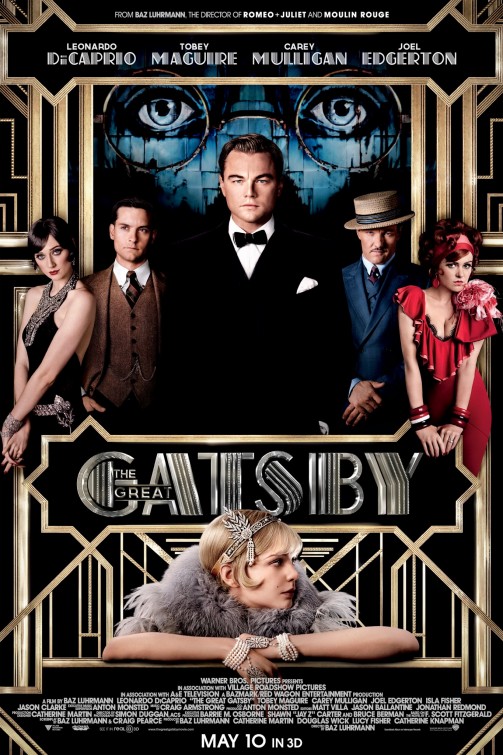Greatness Is But A Word
Director
Baz Luhrmann
Starring
Leonardo DiCaprio
Tobey Maguire
Carey Mulligan
Joel Edgerton
Elizabeth Debicki
Imagine the most finely tuned, sublimely crafted instrument known to man. Like a piano that emits a sound so serene and delicate yet powerful and enchanting. Now imagine the same individual that crafted this marvel sprayed it neon pink and pushed it down a hill toward a ramp, leading to a flaming skip. That’s The Great Gatsby.
Told in flashback by Nick Carraway [Maguire], the story reflects on a young man’s move to New York in the economic boom of the 1920’s. Nick has obtained a small caretaker’s shack in between the giant mansions of ‘new money’ and lives across the bay from his cousin, Daisy Buchanan [Mulligan] and her husband (also his university acquaintance), Tom Buchanan [Edgerton]. Their servants, possessions and lifestyle overwhelm the humble Nick but he acts graciously nonetheless, oblivious to the fact that Tom is having an affair. Whilst visiting his cousin, Nick is introduced to the attractive yet cynical (not to mention sheer embodiment of the 20’s flapper) Jordan Baker [Debicki] and the two begin an odd relationship. Nick’s neighbour lives in utter secrecy and although he throws lavish uproarious parties each weekend, he is never actually seen. Myths and legends begin to permeate around their host, the reclusive Gatsby [DiCaprio]. Over time Nick and Gatsby form a curious friendship and it becomes apparent that the mansion, the parties, the money has all been used to get the attention of Daisy. And a lot of other stuff happens and I’m not going to ruin the story.
One of the most vital and crucial factors to the success of a story like The Great Gatsby, is the cast. F. Scott Fitzgerald’s characters are so wonderfully designed and so open for interpretation that the potential embodiments can make or break the entire production. Amazingly, each and every role is cast beautifully. More so than that, the portrayals of the characters are pitch perfect and every now-and-then you get a brief glimpse into what could be a spectacular stage production before Luhrmann makes some crackpot decision and you’re taken out of the moment. The chemistry between Maguire and DiCaprio feels more than real (probably something to do with the fact that they are childhood friends) and both male leads are the very cinematic personification of Fitzgerald’s character’s qualities. If you think of a timid tourist, stepping through a lavish world that he clearly doesn’t belong in, chances are Tobey Maguire’s name is going to come up at some point. At the same time, if you ask who has overwhelming onscreen charm, bravado and presence while being able to channel crippling insecurities, DiCaprio is a given – seriously, someone needs to give that man an Oscar or five. But even if you had two brilliantly cast male leads, Gatsby would be nothing without Daisy. Cue Carey Mulligan, who for the last six years has done no wrong and gone from strength-to-strength. Confident, foolish, spoiled, terrified, trapped, lost, passionate, delicate, Mulligan is everything one could ask for in this role. But it doesn’t stop there, the entire supporting cast are exceptional, from the extras to pivotal characters, no matter how long on-screen, everyone performs admirably.
At times, the lavish visuals are spectacular. The colours, scope and scale of 1920’s New York are intoxicating. Everything feels overtly alive, as if injected with a fantastical hyper-reality that we mere mortals could only dream of experiencing. And therein lies the problem; in trying to replicate the comparative excess of the Roaring 20’s and the Jazz Age, the production heightens proceedings beyond even contemporary expectations. A good example of bootlegging parties and the debauchery of the wealthy would be something like Boardwalk Empire. The key difference, however, is that Boardwalk Empire keeps everything grounded in reality. Without it, The Great Gatsby comes off as an impossible dream. While I understand the reason for this, to give jaded audiences something to relate to, it overshadows the real soul of the story. On top of that, there are the odd and frankly disorientating directorial and editorial choices. There’s nothing specifically jarring but certain snap-cuts, poorly rendered green screen work, unusual cross dissolves and other gimmicks take you away from the acting and the core drama. As if Luhrmann read the book’s narrative as an exact visual cue. “I was within and without? Well we should show him in a house looking out of a window and at the same time, on the street, looking up at himself! Brilliant! Oh, for the cleverness of me.” No, Luhrmann. No. If that wasn’t enough, the score and soundtrack are inspired and distracting. Long-time Luhrmann collaborator, Craig Armstrong delivers atmospheric instrumentals, while Jay-Z has produced a wonderful harmony of musicians and singers. Having said that, it’s still really fucking weird when you hear a jazzy trumpet (typically iconic to twenties society) bleeding into Roxy Music’s Love Is The Drug!
I have no doubt that this will be one of the most divisive films of the year. For every single positive attribute, I’m slapped with a negative. If I start to think back fondly, or show any sort of enjoyment toward the release, my subconscious will conjure a particular scene or image and I’ll instantly grit my teeth. Going back to my opening piano analogy, it’s as if watching a fantastic drama (let’s say The Third Man), with all the key elements working harmoniously except it’s been directed by Sam Raimi. Nothing wrong with Mr. Raimi’s work but he’s so very wrong for that project. Equally, Baz Luhrmann, while you’d presume would be a perfect fit, is so very wrong for this film. And what we’re left with is a lie; a bright, colourful, flaming disappointment. It’s almost tragically fitting.
Release Date:
17th May 2013
The Scene To Look Out For:
Introduced with all the majesty, pomp and circumstance afforded to such a mysterious individual as Gatsby, the rainy scene in which Gatsby invites himself over to Nick’s shack is hilarious. The comedic timing is spot on, the insecurities shine through amazingly and the desperate hopelessness (or hopefulness) of the whole thing is marvellous. Hard to explain without giving away major plot points but this is the real turning point, the moment when the audience starts to realise that there is a great deal more to these two dimensional, superficial people.
Notable Characters:
As stated above, everyone is on fine form. But at the end of the day, this really is DiCaprio’s film. But to keep showering him with praise and stating the obvious feels somewhat repetitive, so I’ll focus on Elizabeth Debicki instead. An Australian actress with few credits to her name, Debicki really stood out and went toe-to-toe with some genuinely powerful performers. That’s not a task taken lightly and her portrayal of the quintessential 20’s upper society broad is truly engrossing and impressive.
Highlighted Quote:
“I was within and without, simultaneously enchanted and repelled by the inexhaustible variety of life”
In A Few Words:
“Both the perfect representation of the societal excess at height of the roaring 20’s and a horrendously edited, colossal monstrosity, despite the superb casting”
Total Score: 3/5
![The Red Right Hand Movie Reviews [Matthew Stogdon]](https://reviews.theredrighthand.co.uk/wp-content/uploads/2021/12/cropped-header1.png)




